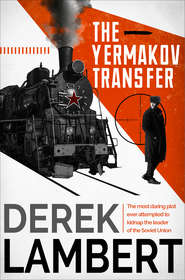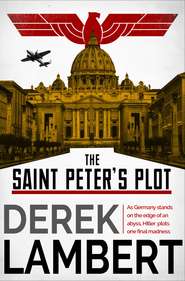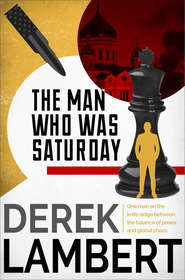По всем вопросам обращайтесь на: info@litportal.ru
(©) 2003-2024.
✖
The Red House
Автор
Год написания книги
2018
Настройки чтения
Размер шрифта
Высота строк
Поля
‘I could see that. It is never fortunate for a man when he is kicked in the crotch and rabbit-punched. But why, Brodsky? Why?’
‘He was a very foolish boy.’
‘What happened?’
‘You need not concern yourself. It was a small irritating incident and you have the great task of adapting yourself to life in this self-indulgent society in which we find ourselves. It was the foolishness of youth. A girl, too much whisky—watch the whisky, comrade. He will wake up in Moscow and be dealt with there. A small punishment, probably, plus the knowledge that he has ruined his career.’
‘I think he tried to defect.’
Brodsky sighed, holding up one delicate hand as the woman came to clear the table.
‘More coffee?’ she asked.
‘Please,’ they said.
‘Coming up.’
She was blonde and Germanic and smiling, but she moved like an automaton, like the girl who sold him the newspapers. A symptom of being a menial in an affluent society, Zhukov supposed. She brought more coffee and they thanked her and she said, ‘You’re welcome.’
‘Did he try to defect?’ Zhukov asked.
‘That is a very dramatic and contemporary word. He simply decided that he would like to stay with this American girl.’ Brodsky reached for his inhaler. ‘I suppose you might as well know the full story.’ (Which meant he would be lucky to hear a half-truth.) ‘He arranged to meet an American in a café in Queens. She was going to help him disappear for a while. But we were waiting for the unfortunate Boris Ivanov in the café.’
‘You mean you made some sort of deal with the Americans?’
Brodsky shrugged delicately. ‘It really isn’t my business. I can only tell you what I have heard. He was only a boy after all. I suppose he had nothing much to offer the Americans …’ He put away the plastic white bullet. ‘Not like you, comrade. If you were ever in a position to take such foolish action.’
The song had left his lips. Replaced by the voice of secret authority that served Czars and other dictators and the Party with unswerving treachery; the voice of those who chose murder and intrigue as others choose dairy farming or quantity surveying.
And here was the voice in a coffee shop on 42nd Street, New York City. Zhukov’s reactions chilled: Grigorenko was the underline, Mikhail Brodsky the boss. Perhaps the boss, with an Ambassador, a Minister Counsellor, counsellors, secretaries, attachés under him.
‘If you think I am the sort of person who would take such an action then I should never have been sent here,’ Zhukov said.
‘I didn’t make the choice.’ Brodsky lit a mentholated American cigarette. ‘But it was very foolish of you to go wandering around in New York on your first day here.’
‘Apparently I was not alone.’
‘You could have been mugged.’
‘Mugged?’
‘Robbed, beaten up. I don’t know how the word came to be. Perhaps because only mugs allow themselves to be robbed.’
‘In broad daylight?’
‘Certainly in broad daylight. This is a dangerous and decadent society, comrade. A man will knife you in a cinema queue for the money to buy drugs.’ He leaned forward, blinking behind his gold-rimmed spectacles. ‘Like myself you are a sensitive man. You write poetry, I believe?’
‘How did you know that? It’s never been published.’
Brodsky slipped the question. ‘I too write poetry. Some of it has been published in Novy Mir. And once I wrote an amusing little poem about Russian women wearing shorts. Calling them shortiki—an American-derived term—instead of trusiki. It was quite well received.’
‘I’m happy for you,’ Zhukov said.
‘I’m trying to illustrate that people like ourselves should be both sensitive and realistic. It’s not wise to let sensitivity get the upper hand in this country. Values can become unbalanced in a sensitive mind. You can be dazzled by the abundance of food and drink and clothes and apparent freedom and forget the misery and oppression and violence.’
‘Thanks for the warning,’ Zhukov said. ‘I had many like it before I left Moscow.’
‘Nevertheless these first impressions can be quite traumatic.’ He sang a couple of bars and relaxed. ‘Now it seems to me that we should go.’
The woman behind the bar called out, ‘Goodbye, folks. Have a good day.’ And confided to her senile suitor in the Stetson, “English tourists—I can always tell ’em.’
But Mikhail Brodsky was not quite finished. ‘The safest place to talk,’ he confided, ‘is in a crowded street.’
They cut down Madison Avenue, turning right down 53rd. Zhukov looked with pleasure at the legs of the mini-skirted girls and surmised that they must have very cold arses.
Brodsky walked very carefully, despite his rubber overshoes, leaping like a ballet dancer over the street-corner swamps.
After a while Zhukov asked him what was on his mind.
‘I believe certain approaches were made to you in Moscow.’
‘Such as?’
‘About your responsibilities in Washington. Above and beyond the call of duty.’
‘They told me to keep my eyes and ears open for any information that might be useful to the Soviet Union.’
‘A delightfully euphemistic way of putting it.’ Brodsky leaped a small lake on the corner of Lexington. ‘Mr Hoover has estimated that eighty per cent of all personnel at the Soviet Embassy in Washington are spies.’ His gold glasses slipped and he pushed them back with his woolly-mittened hand. ‘Who would have thought that the great Mr Hoover would have indulged in such understatement?’
While he was waiting for Valentina to powder her nose Zhukov flipped through the Manhattan phone book. One number printed prominently at the beginning startled him. U.S. Secret Service 264–7204. It didn’t seem to Vladimir Zhukov to be very secret.
3 (#ulink_e54eab7e-8261-51af-b623-463002db339a)
THE Red House in Washington is a greyish building on 16th Street a few blocks—two-fifths of a mile maybe—from the White House. It is fairly ornate having been built for a good capitalist, Mrs George M. Pullman, whose husband designed and built Pullman cars for America’s railroads; and one of its first tenants was the Embassy of Czarist Russia. But the building, four storeys high including the ground floor, is a poor place compared with the great mansions of other countries ranged along Embassy Row, Massachusetts Avenue, where many expansive architectural styles vie with each other. (Here Britain seems to score with a statue of Sir Winston Churchill, who looks as if he might be hailing a bus, outside their elegant manor.) The Russians are perpetually aggrieved at the faded modesty of their home, but the Americans decline to do anything about it until they are given a better Embassy in Moscow. Likewise the Russians refuse the Americans more resplendent accommodation until they are given more prestigious premises in Washington; this childish intractability is often said to be symbolic of the two powers’ attitudes towards settling larger issues such as wars.
A small driveway leads up to the door, only twenty feet from the sidewalk. The windows have balconies; there is an undistinguished tree, pleading to be struck by lightning, in the small front garden, wire netting around the hedge, some interesting aerials on the roof arranged in the sort of art forms that normally outrage the Kremlin. Outside a West German Volkswagen or two, with diplomatic plates, which seems to indicate that ideological differences need not stand in the way of commercial economy.
Among the Embassy’s neighbours are the National Geographic Magazine and the University Club. The Washington Post lies around the corner.
A little way down 16th from the Embassy C.I.A. agent Joseph Costello sat at the wheel of his Thunderbird chewing on a dead cigar butt and privately expressing his opinion on what Mother Russia could do to herself. Snow mixed with freezing rain bounded along the street encasing the car in ice. And what’s more he wouldn’t put it past the stupid bastard to walk: he wouldn’t put it past a Russian to break the ice on the Potomac and go for a swim.
But I know my limitations, Joe Costello, Vietnam veteran and hero, acknowledged. Not for me the cocktail parties with The Beautiful People. I am strictly for surveillance and I am eternally grateful for the opportunities afforded me by my heroism (refusing to act stupid in front of my buddies) under enemy fire. Costello, hairy, squat and honest, further confided to himself: I wish to hell I’d made the grade as a professional football player for the Redskins. Still, I’m lucky to have a job like this, a cut above the F.B.I., two cuts above the precinct.
But surveillance on a shitty night like this! And for what? All he knew was that he had to follow the Russian and make sure that the meet with the State Department clerk took place as scheduled and that the Soviets didn’t try and hi-jack the clerk or anything. As far as he, Joe Costello was concerned, he would be very happy if they put a bullet in the State Department guy’s guts if he was a traitor. But who was he to express an opinion? Just surveillance.
Tardovsky, tall and thin and unmistakable, emerged from the embassy. Please get in your nice comfy little Volks, old buddy. But the Russian bent his thin neck into the rain and snow and walked quickly down 16th.
You sonofabitch! Costello got out of the car quietly and spat the cigar butt on to the sidewalk.











